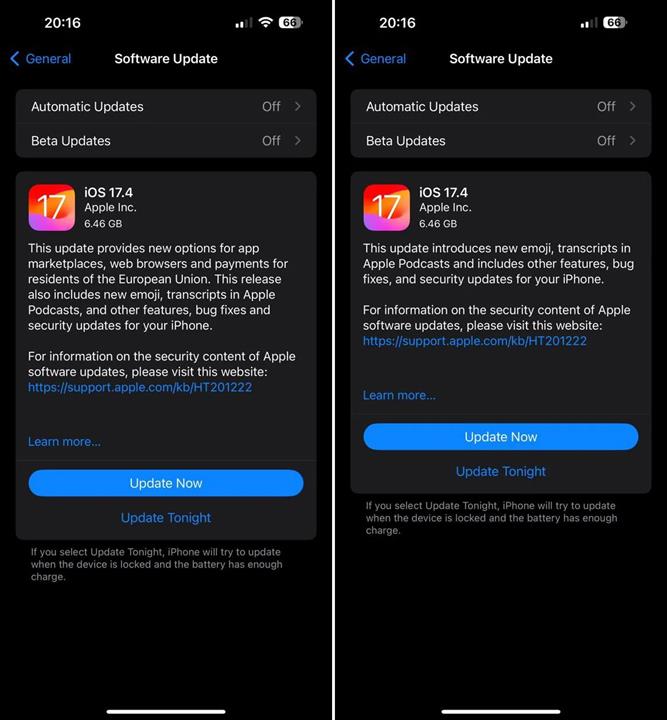Apple has released iOS 17.4 and iPadOS 17.4. The latest update adds support for third-party app marketplaces in order to comply with the European Union's Digital Market Act, which comes into effect today.
iOS 17.4 adds support for third-party app marketplaces
The biggest change in iOS 17.4 is that it finally allows alternative app marketplaces, aka sideloading, so iPhone and iPad users will be able to download and install apps from third-party app stores. There are some rather strict restrictions for app developers, including a hefty 27% commission fee. It remains to be seen which app stores pop up in the EU, so far the Epic Games store, SetApp, and Mobivention have announced that their app marketplaces will be available soon.
Default browser and browser engines for users in the EU region
iPhone users in the EU will see a new prompt when they open Safari for the first time, which will ask them to choose the default web browser of their choice.
iOS 17.4 also allows web browsers with alternative browser engines. In case you didn't know, until now, Apple restricted iOS web browsers to use the WebKit engine that powers Safari. Now, browser makers will be able to use their own engines for their browser apps. So you could soon be able to use Google Chrome with Blink, Mozilla Firefox with Gecko, possibly with support extensions as well. Browser developers have criticized the move, because Apple has restricted these true versions to the EU, meaning they will have to maintain two versions of their browsers; one for the EU, and the watered-down version for the rest of the world.
Alternative payment options for apps in the App Store
Apple is finally allowing third-party payment methods for apps that are available on the App Store. These payment options will be marked with a badge, aka a scary-looking warning that the user will be redirected to a website that is not associated with Apple, for completing the transaction.
List of Countries that are eligible for third-party app marketplaces on iOS 17.4
Apple has already confirmed that the changes only apply to users living in Countries that are members of the European Union. But users in other Countries in Europe such as Norway, Switzerland, Turkey, The UK, etc., will not gain the benefits that are available to EU members. Here are the Countries that support third-party app stores in the EU.
- Austria
- Belgium
- Bulgaria
- Croatia
- Cyprus
- Czechia
- Denmark
- Estonia
- Finland (and Åland Islands)
- France (and French Guiana, Guadeloupe, Martinique, Mayotte, Reunion, Saint Martin)
- Germany
- Greece
- Hungary
- Ireland
- Italy
- Latvia
- Lithuania
- Luxembourg
- Malta
- Netherlands
- Poland
- Portugal (and Azores, Madeira)
- Romania
- Slovakia
- Slovenia
- Spain (and Canary Islands)
- Sweden
Apple has several restrictions in place to protect "its interests", aka the sweet 30% commission fee that it earns from app developers. So you can't merely change your device's region to a European country, or use a VPN or something like that. Some reports indicate that the operating system detects the user's physical location (GPS), the region that the Apple ID was created in, to prevent users from "abusing" the changes.
One interesting bit in Apple's support document is that users will lose access to alternative app marketplaces if they travel outside the European Union. There will be a grace period during which the apps will work, but if you stay away for too long, you'll lose access to the third-party app stores, though you will be allowed to use the apps that were already installed on the phone.

Users in the EU are getting a different release notes (image courtesy: iSWUpdates), while users from the rest of the World are being shown a different one, to highlight the changes that correspond to their region.
Other changes in iOS 17.4 (available worldwide)
Apple Podcasts now supports Transcripts, allowing you to read the text that highlights the audio (in sync). It supports English, Spanish, French and German. You can also search for text in an episode, tap on it to play from a specific point. The improvements also support accessibility features such as Text Size, Increase Contrast, and VoiceOver.
The Apple Music app's recognition algorithm now lets you add songs you have identified to your Playlists and Library, as well as Apple Music Classical. Siri has gained the ability to announce messages you receive in any supported language.
Apple has improved Stolen Device Protection, with a new option that requires increased security in all locations. The Battery Health screen now displays the battery cycle count, manufacture date, and first use stats. This information is available on iPhone 15 and iPhone 15 Pro models.
Call Identification now displays Apple-verified business name, logo, and department name when they are available. Similarly, the Messages app Messages displays Business updates such as order status, flight notifications, fraud alerts or other transactions you opt into. You can now type your Apple Cash virtual card number or use Safari's AutoFill for transactions at merchants that do not support Apple Pay.
Apple says it has fixed an issue where contact pictures were blank in the Find My app. A bug was causing the user's phone number to be visible in groups where they had participated, when the user had switched from a primary number to a secondary one in Dual SIM configurations. The Cupertino company has patched the bug in the latest software. The iOS 17.4 update adds a handful of new emojis to the keyboard including a new mushroom, phoenix, lime, broken chain, and shaking head.
Apple has patched 4 security issues in iOS 17.4 and iPadOS 17.4, including two vulnerabilities (Kernel, RTKit) that were actively exploited by hackers.
Thank you for being a Ghacks reader. The post Apple releases iOS 17.4 to add support for third-party app stores in the EU appeared first on gHacks Technology News.


0 Commentaires